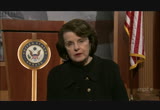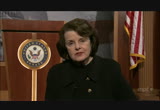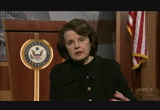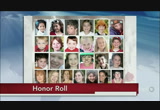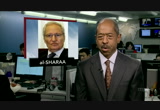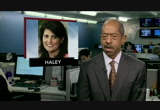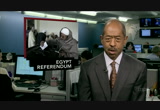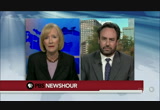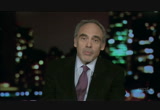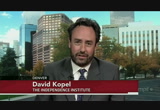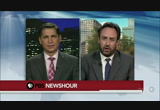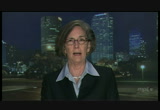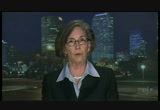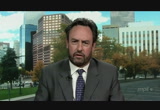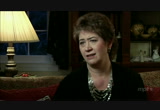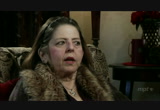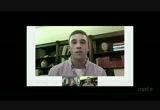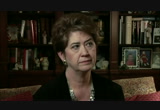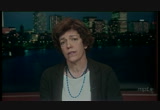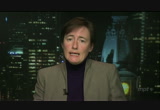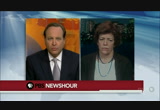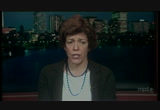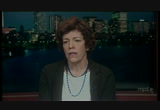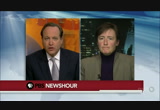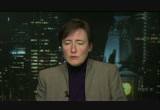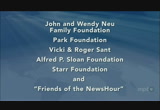tv PBS News Hour PBS December 17, 2012 6:14pm-7:00pm EST
6:14 pm
>> ifill: gun control activists have said that they believe that the president's first term are a failure. people who are gun rights activist said the people wants to legislate the second amendment out of existence which is true or is neither true? >> neither is true. i think the president has an open mind. at least i hope he has. i think the fact that i've authored something before which became the law hopefully will have some credibility with him. we're very happy to sit down with his staff, which is what i want to offer to go over the specifics of the legislation, options and get his views. i'd like to do that sooner rather than later because we're working with others. it want to work with members in this body, members in the other body, and try to see that by the beginning of the year, we've got something where there is in very good support. >> ifill: what do you say to people who support the right to own arms that this is the camel's nose under the tent. the next thing you'll be after is concealed carry weapons,
6:15 pm
you'll be after other kinds of gun rights? >> that's just not true. it wasn't true with the prior bill that was the law for ten years. and i just think candidly that dog doesn't hunt >> ifill: why shouldn't it be true? why wouldn't you want to go after those other laws? >> that's not what i've done in the past. it's not what i'm doing right now >> ifill: as we have this debate now, how much are we focusing on guns and how much are we focusing or should we be focusing on the things that drive people to use guns in these horrific ways? >> i think you concentrate on both. you concentrate on mental illness and what we can do. you concentrate on safety in schools and those kinds of things. but small children have a basic right to go to a school and feel safe. and these guns, because they kill large numbers of people very quickly, they aren't used for hunting, they aren't hunting weapons, you don't need them for
6:16 pm
defense. they are military-style weapons. they don't belong in the streets of our cities. or our towns >> ifill: finally, senator feinstein, we have been here before. the president, as he said last night, has spoken at four different memorial services for shooting victims since he's been president. each time there's been discussion that this is the moment especially after a congresswoman was shot, this is the moment when everything will change. why is this the moment? >> well, this is the moment because i think people have had it. they have had it in fear. you know, look at aurora. that man came in with 100-round clip, excuse me, drum. if that drum hadn't jammed he would have killed many more people. look at virginia tech. look at jones town. look at jonesboro, rather. looks at columbine. look at what's been happening. it's got to stop. our schools have to be safe
6:17 pm
places. these guns are the guns that the grievance killer, the gangs that people who want to do real damage look for and find very easy to obtain in our society. we need to change that. that's what i'm trying to do. >> ifill: senator dianne feinstein, democrat of california, thank you >> thank you, gwen ifill: an administration official told the newshour today that the president has been talking with white house staff, the vice president and some members of the cabinet about ways the country can respond to the tragedy in newtown. >> woodruff: we devote the rest of the program tonight to the shootings in connecticut with the tough policy decisions ahead for lawmakers; the grieving in newtown; the questions and answers for teachers and students; plus, a special honor roll remembering those murdered. but first, the other news of the day. here's kwame holman. >> holman: a car bomb exploded outside a compound used by a u.s. construction company in kabul, afghanistan, today. the firm builds facilities for
6:18 pm
the u.s. military. two afghan workers were killed, and more than a dozen others were wounded. the taliban claimed responsibility. and in the east, villagers held funerals for nine young girls who died in an explosion in nangarhar province. police said they may have triggered a land mine left over from the time of the soviet invasion. meanwhile, in northwest pakistan, a car bomb in a crowded market killed 17 people and wounded more than 40. the blast left a scene of scorched wreckage. in syria, the vice president now is warning that neither side will win the battle for control of the country. farouk al-sharaa is a longtime ally of president bashar al- assad's family. in an interview, he called for a national unity government with "broad powers." meanwhile, the violence raged on. rebel fighters claimed they captured an army infantry college near the northern city of aleppo. president obama and house
6:19 pm
speaker john boehner met today, amid signs of possible movement in the "fiscal cliff" negotiations. it was widely reported boehner gave ground on friday, and offered to raise tax rates for people earning more than $1 million a year. the president wants the threshold to be $250,000 a year. white house spokesman jay carney declined to address boehner's offer directly, but he did say this. >> the only plan that we have seen that achieves the size and the balance that's required for sustainable... for long-term deficit reduction and putting our economy on a sustainable fiscal path is the president's. >> holman: also today, senate majority leader harry reid warned members may have to return to work the day after christmas in order finish legislation to avoid the new year's deadline triggering across-the-board tax hikes and spending cuts. wall street started the week on a high note. stocks were buoyed by hopes of progress in the washington deficit talks. the dow jones industrial average gained 100 points to close at
6:20 pm
13,235. the nasdaq rose 39 points to close at 3010. traders also paused for a minute of silence this morning, to remember the school shooting victims in connecticut. republican congressman tim scott of south carolina will become the first black senator from the south since reconstruction. he was awarded the congressional medal of honor for bravery in world war ii and was electedded to the senate in 1962. he gained national attention on the senate watergate committee and became president protem of the senate, the third in line to succeed the president. he was 88 years old. governor nikki haley announced the appointment of the first- term lawmaker today. he'll fill the seat of republican senator jim demint, who's resigning to lead the heritage foundation, a conservative washington think tank. scott will serve two years, and
6:21 pm
says he plans then to face election in his own right in 2014 for a full six-year term. voters in japan have chosen a new prime minister, shinzo abe. he led the liberal democratic party back to power on sunday, in a landslide victory. abe has pledged to ease monetary policy to pull japan out of its fourth recession since 2000. he also vowed to take a firm stance on territorial disputes with china. abe served as prime minister once before, but he quit in 2007, citing ill health. opponents of egyptian president mohammed morsi are sounding the call for nationwide protests again tomorrow against a constitution drafted by islamists. the opposition was bolstered after saturday's first round of voting on the document. only about a third of eligible voters turned out, as 57% approved the draft-- a much lower level of support than predicted. the second round of voting is saturday. those are some of the day's major stories. now, back to judy.
6:22 pm
>> woodruff: and we pick up now on some of the major questions being asked about guns, mental health and other issues in the aftermath of the shootings. we get four perspectives. dan gross is the president of the brady campaign to end gun violence. david kopel is an adjunct professor of constitutional law at the university of denver and the research director for the libertarian-leaning independence institute. katharine nordal is with the american psychological association. and dr. irwin redlener is a pediatrician at columbia university who works on public and family health issues. he's the president of the children's health fund. we thank you all for being with us. i want to begin with you, david koppel. we just heard senator dianne feinstein say that what happened in newtown, connecticut, was the straw that broke the camel's back, that it is now time to reinstate the ban on assault weapons at the very least. do you agree with her? >> well, i think we can look at what happened when she had her
6:23 pm
ten-year ban in the past. the congress ordered that a formal study be done of the results of it. the study was performed by the urban institute, a very well respected somewhat left-leaning think tank in washington d.c., and the urban institute reported that it had no effect on homicide rates. there was no statistically significant benefit in terms of saving lives. >> woodruff: dan gross with the brady campaign. if that's the case, what's the argument for a ban on assault weapons or on any other guns? >> i mean, i think we need to look at this in terms of -- i agree with the last statement to some extent -- in terms of the greatest opportunity to save lives and to look for those places where the american public, gun owners, non-gun owners, n.r.a. members, agree on solutions. so, you know, there's certainly a major conversation that's happening in the wake of this terrible tragedy around an assault weapon ban.
6:24 pm
another conversation that's happening is around background checks. you know, 40% of all gun sales in our nation aren't subject to background checks which means that convicted felons, domestic abusers, the dangerously mentally ill can buy guns without any questions asked. a frank lunts poll showed that 74% of n.r.a. members support a solution like that. i do think we should be looking for the common ground, the fertile ground. that's the conversation that the american public wants to have. president obama put it very poignantly last night when he said we need to ask ourselves, are we doing enough to protect our children? if we're going to be honest we have to say we can do better than this. the american public certainly backs that sentiment >> woodruff: dan gross, do i hear you saying that it's more productive not to focus on the assault weapons ban but instead to look at background checks and other ways of trying to prevent people from getting these guns in their hands? >> i think the background check can help. i mean you just look at the impact... i'm sorry. the assault weapons ban.
6:25 pm
look at the impact on our national psyche on events like this, the national psyche of having these military-grade weapons available. i do think we need to take a step back and look at this whole thing in the context of how many lives... you know, aside from these horrific mass tragedies, there's 32 murders that happen every day in our country. how can we prevent most of them? i do happen to think that doing something about assault weapons is an important step in that direction. i know the american public want to have that conversation but i don't think it should be the only part of the conversation. i think we very importantly need to talk about criminal backgrounds checks >> woodruff: dr. irwin redlener, you're someone who has looked at this issue over a long period of time. how do you see it? do you think this is the moment when, as senator feinstein said, something has got to change? >> well, i do think it's a moment when something has got to change. there are a lot of elements in this. if we just take the example of this horrendous tragedy that took place on friday, there are so many issues to be discussed
6:26 pm
here, one of which is the fact that we are now a country absolutely overloaded with guns. many of them are guns that really only belong on battlefields in combat situations where we're talking about something on the order of 275 million guns in the united states. it's really too late to put that genie back in the bottle. but i think the least that we can do is to begin really cutting back on the new influx of these kinds of weapons that do not belong in the hands of citizens. i don't think there's any question about that. that won't be the answer, however, to what we saw on friday. we will have to look at some of the other concerns having to do with access to mental health service for people. how do people recognize when they do problems that need serious professional help? we have to deal with the stigma of identifying people with those kinds of problems. and we have to deal with making sure we understand that our schools are safe and protected as much as they can. very complex issue that's not going to get cured by any one of
6:27 pm
these particular actions but all of them together have to demonstrate that we care about the safety and security at the end of the day especially of our innocent children. >> woodruff: in fact, those were the words used by the president. he said it's a complex set of issues that's going to require a complex solution. before we get into the mental health question, i do want to do that, let me come back to you, david koppel, because what we're hearing is that banning assault weapons may be a solution. another one may very well be tightening up those background checks, not making it so easy to get these lethal weapons that many folks are saying only belong on the battlefield. >> well, none of these guns as senator feinstein is talking about is used by any military anywhere in the world. what's admitted here is that connecticut is one of those half dozen states that has a ban on so-called assault weapons and that the firearm that the murderer stole from his mother
6:28 pm
after murdering her is not an assault weapon under connecticut law. so this just illustrates that this category of assault weapons is really a sham. it's based on the cosmetics of the gun, how they look and not how they function. they aren't military guns. they don't fire like machine guns. they fire just one bullet at a time like every other firearm. we should certainly... >> i think the question was about back checks >> we should be concentrating on mental health and constructive reforms like that rather than things that are really entirely cosmetic. back in 1991 a guy who was also mentally ill used a pair of ordinary handguns to murder about two dozen people in a cafeteria in texas. the question isn't what gun the psychopath has. the question is why is that psychopath walking around loose where he can harm people >> how do we feel about background checks to prevent that? it was interesting. the question was about background checks.
6:29 pm
what can we do precisely? we all agree. i mean like i said 74% of n.r.a. members agree with this. you know, what can we do to keep guns out of the hands of those mentally ill people who are dangerous? people talk about strengthening the system which is very important in terms of making the background checks that we do better. we just have to clarify here. 40% of all gun sales in our country require no background check whatsoever which means a convicted felon, a domestic abuser, dangerously mentally ill, god forbid a terrorist can buy guns without any background check. i just don't understand, as this national conversation is to passionately dead indicated to preventing tragedies and grieving like this, you know, the only place where this seems to be a divisive debate and you don't get answers to the question you just asked is in the context of forums like this because out in the forum of the american public we're talking to victims every day. we're talk to go the american public. we want solutions to this.
6:30 pm
you know, once i'd like a straight answer to that >> woodruff: i'm going to bring dr. nordal into the conversation with the american psychological association. we heard dr. redlener. we're heard our other guests speak about it's a complex problem. it's going to be to have a complex solution. how difficult is it to create a better screen for individuals who have access to these guns? >> well, i think the problem certainly, judy now is that we don't have a really good way of predicting the people that are going to commit these kinds of heinous crimes. i hope that in all of this discussion that as a country we do not lose sight of the fact that at the root of a lot of the problems with violence in this country and in the victims of violence are unmet mental health needs. we need to start... we certainly need to be able to better identify people who are going on commit these kinds of heinous crimes but we also need to be able to better identify youth
6:31 pm
who are at risk to later develop meantal health problems. we need better prevention programs in schools like the anti-bullying campaigns. we need well trained school counselors. we need school psychologists that are doing something other than testing children for special education classes that can work with teachers and administrators and families to identify young people that are developing problems, that are sending up red flags to get them to the kind of help that they need. we need better funded university counseling centers. we need just better access to mental health treatment. there is still a stigma associated with mental health treatment. thank goodness the affordable care act includes mental health benefits as part of the essential health benefits in the new insurance plans. these benefits will be available through the medicaid expansion and the programs offered through the exchange. but mental health services are often very difficult to access.
6:32 pm
they're expensive. there are lots of hurdles to getting the services. from my perspective as a psychologist, very unfortunately over the last couple of decades we've seen a decrease in the use of psychotherapies and evidence-basedded psychological interventions for mental health problems and much much more of an emphasis on prescribing medication. it's horrendous to think that, for example, in 2008 that some 58% of children that presented with mental health problems were prescribed medication and had no other form of mental health intervention. so we have a system that needs some fixing. >> woodruff: dr. redlener, given all the prescriptions that we just heard from dr. nordal, where does this country begin? >> well, first of all, dr. nordal is completely correct in what she said. i think we took a giant step really with obama's affordable care act. that's going to really help us get into the notion that we need to destigmatize mental health and allow people access to the
6:33 pm
care that they need. but i do want to point out about the background checks related to this. remind people that the acquisition of those firearms that were used on friday was by somebody who was apparently not having mental or psychological problems, who followed the letter of the law in getting those guns legally and the guns were acquired by her son who obviously had extraordinary problems. so simply the background checks alone which by the way i totally agree we need to tighten but they're not going to do the trick in terms of entirely eliminating this problem. it's like we were saying before, judy, a complex problem with complex answers. the final point is this notion that those were normal typical guns is balogne. having high capacity magazines that hold dozens of bullets in them is not something for hunters or for house protection. this is something that is not used in normal circumstances. and to belittle the fact that
6:34 pm
these were in fact military type weapons that were used doesn't make any sense at all. >> woodruff: dan gross, if you were in a position where you could make something happen, what would be -- and i want to ask all of you this question -- what are the first things that need to happen at&t this point when the country is focused on what happened last week in connecticut? >> i think there are two very important areas of change. one is policy. i think we need to have the conversation about these military-style weapons and very importantly about background checks. but i also think the other part ties with your other guest's comments about the memental health system and actually awareness in education. yeah, you know, president obama very compelling said last night, "we're never going to prevent everyone of these tragedies from happening, but that's not an excuse for inaction." background checks wouldn't have prevented last night. you know what might have? education about the danger of bringing guns into the home
6:35 pm
where you have a child that is a danger to either themselves or others. i'd love to see the clinical community get involved >> woodruff: i'm going to interrupt you because i need to give everybody a chance to say something here at the end of the david koppel, the next thing that needs to happen is what? >> stronger state-level laws for civil commitment of the dangerously violently mentally ill. about one third of the difference from state to state in homicide rates is due to the strength of those civil commitment laws. in some states a weakness than other states. if all states moved up to the strong standards and then even better provided the funding that necessary for the treatment of those people, that would have a significant effect. not just on these horrific sensational crimes that get on tv but on a lot of homicides and other violent crimes that are committed and never make the news >> woodruff: finally, catherine nordal
6:36 pm
>> i think we certainly need to have all the policy folks ghettoing from the health care community as well as the law enforcement and education community. but we really need to work very hard to make people comfortable in seeking help for meantal health problems. we need to do a lot more to reduce the stigma associated with seeking that kind of care. i think we need to money in prevention. we've done a very poor job in putting money in prevention particularly around meantal health issues. we can solve problems much more rapidly when we can intervene at an earlier stage and not have to wait until something horrendous like this has happened. >> woodruff: dr. nordal, dr. redlener, dan gross, david koppel, we thank you all four >> thank you. ifill: on >> ifill: next, we turn to the communities and the people who are in mourning and coping with the tragedy. first, a report from newtown. hari sreenivasan is there. sreenivasan: the signs of grief mingled with hope are at
6:37 pm
almost every turn in newtown connecticut from the makeshift memorials with angells and candles to the flags at half staff to the small new england main streets packed with satellite trucks beaming back the news to the far corners of the earth. they're all gathered to tell stories of the smallest victims and the heroes who saved many more. heroes like principal dawn hochsprung >> this is her dancing in a... suarez: lillian bitman helped hire hochsprung. she ran the school newspaper for 13 years, but her ties to the school were tragedy struck run far deeper. her three children attended sandy hook elementary >> for me personally because i've been so involved with the school for so long, it is my heart. i just felt like he had come into my home and done this. this is how i felt. then i started to panic about all the teachers i know there >> suarez: teachers hike vicki soto who died shielding her first grade students with her
6:38 pm
own body >> the kids loved her. the kids on my newspaper, she was one of our favorites. everyone wanted to interview her all the time >> suarez: and of course principal hochsprung >> i laugh because we have a sock hop every year. and the kids are all in, you know, 1950s costumes. she dressed up in a poodle skirt. she was short enough where i would lose her on the dance floor. all the adulls danced with all the kids. a wonderful event. it's actually (crying) my favorite activity that the school did because you had all the generations dancing to rock'n'roll. and that was just so indicative of sandy hook school. >> you know, it's going to take i think months and years for this community to heal from what's happened. >> sreenivasan: this woman is a psycho therapist who helps this community deal with grief. she warns that the preventive systems to recognize the next troubled individual and prevent the next potential school horror
6:39 pm
are failing >> budgets are so tight in schools that aate lot of these ancillary positions like psychologist and counselors, you know, have been cut or, you know, it's like a lot of schools are running on a bare bones system. there needs to be people to identify kids that don't fit into the social setting. you know, who show evidence that they're struggling. kids that are being bullied. kids who don't have friends. kids who appear depressed. kids who appear anxious. >> sreenivasan: kids who could grow up to become like adam lanza, the individual responsible for the murder of 27 people >> i would say all cases where somebody does something this horrific, there have been many signals for many years that something was brewing. >> sreenivasan: like what? my son was in his graduating class. at newtown high school. he didn't know him.
6:40 pm
he didn't... never remembered his name. that's noteworthy. in a town like newtown for a kid to be relatively anonymous, you know, that's noteworthy. >> sreenivasan: so anonymous that when we thumbed through yearbooks with this family, we couldn't find a mention let alone a picture of lanza, going back as far as the 7th grade when he was listed as camera shy. this is the 2004 yearbook. here in the sixth grade, lanza is on the right. kyle is beside him on the left. kyle is now a junior in college. we interviewed him using the internet. >> he was a very bright kid. very intelligent. you could tell he really cared about school. he was very shy though. very shy. didn't want to look at you in your eyes. if he did, he made you feel uncomfortable. >> sreenivasan: the same day these individual pictures were taken, the class was photographed as a group.
6:41 pm
lanza is the only one missing. krommberg and lanza shared lat up class for three years during high school >> if i would see him in the hallway he was always walking alone. if he was ever walking up to a group of people more than three, maybe four or five people, he would get as close to the wall as possible. he would try to be as far away from them almost as if he were afraid. >> sreenivasan: krommberg feels a mix of anger and sadness, he also feels disappointment because knowing what he does about adam >> i would have done everything in my power to make him feel more belonging to the school if i had known how uncomfortable he was. maybe i would have gone to talk to him on a personal level. who knows? >> sreenivasan: newtown only knows what did happen >> the children? sreenivasan: during our interview with lillian bitman, the list of those killed became official. >> read me last names.
6:42 pm
don't you film this. >> sreenivasan: you knew at least half a dozen of these people personally. >> um-hum. now we get to work. now we support them. we do what we can. we give them meals. we give them hugs. we love them. we take care of their kids if they have any and help them... i mean, we do whatever we can. we just help. >> sreenivasan: help that will be necessary for newtown connecticut to heal. >> ifill: you can read hari's notebook >> ifill: you can read hari's notebook from newtown. that's in the rundown, along with extended interviews with dr. pasacreta and adam lanza's classmate. now, jeffrey brown has more on how schools and parents in connecticut and throughout the country can deal with these headlines of trauma and violence. >> brown: for that, we're joined by two mental health experts who have worked in this area. dr. nancy rappaport is a professor of psychiatry at harvard medical school, and
6:43 pm
directs the school-based programs for the cambridge health alliance. and amy smith is the president of the national association of school psychologists. dr. rappaport, i'd like to start really where hari's piece just ended with children in newtown itself, the ones closest to what happened. what needs to happen for them? >> what needs to happen in some ways is already happening which is the outpouring of support. people are providing to them to say that they have suffered something which all of us feel heart broken that they should have witnessed at any age but certainly at a young age and that their parents, their guardians, their teachers, the country is by their side and that they're not alone with this. >> brown: amy smith, same question for you. staying in newtown and thinking in terms of school and educators, what should they be saying now to the students? >> the thing that will help
6:44 pm
these students the most is to understand that they have the support and that we return them to... the goal is that we return them to normalcy as quickly as possible. they understand that there are... the adults that are with them will listen to their concerns, that they are keeping them safe, that very quickly we will get them back to their routine and get them back to the things that they are more comfortable with. >> brown: staying with you, what does normalcy mean now and routine mean now? >> normalcy in that community will be different for a while. we need to understand that. we need to think of the recovery from this event as being in stages. it's going to take some time. normalcy today is different than it was last week. and we need to first and
6:45 pm
foremost reassure these children that they are safe. we need to reaffirm that they are secure, that there is safety in their environment. we need to examine how the chirp are doing and stay in contact with them. we need to provide a range of services to them and match the needs of the children to the services that we have available. and... >> brown: go ahead. i'm sorry. >> what we want to be able to do is provide the services that the child needs and respond to the needs that they have. >> brown: dr. rappaport, what about children everywhere else? on the one hand, it's a distant incident for many. on the other hand, it happened in a place that they're so familiar with: school. what should be said to them? >> well, first of all, i just want to pick up on the idea of normalcy
6:46 pm
>> brown: okay schools always are doing this kind of providing structure and support and routine so that, you know, children who have experienced the murder in the home or have had, you know, hurricanes or all sorts of tragedies look to schools as a place that is a safe place. that's partly what strikes us as such a heinous act is that what children are safer going to school than they are out of school or before school. schools have been and continue to be a safe haven. they do it by, just as we heard, by providing routines. morning meeting time. and giving people the... and giving children the opportunity to talk about what they're worried about. so i would imagine... i know that many teachers, probably
6:47 pm
more likely starting in the third grade, but have a moment to take the lead of their students and to ask them, have you heard anything about what happened at sandy hook this weekend? and what was it like for you? and sometimes hopefully many teachers have the support of other people, like school counselors, school psychologis psychologists, social workers, the p.e. teacher, so that they had the support so they weren't by themselves while they were having what sometimes can be a painful discussion with students because students sometimes are going to ask us the questions that we as a nation don't know the answer to. why? why did this happen? what will we do as adults in the classroom as a country to keep our children safe?
6:48 pm
and... >> brown: finish. i'm sorry >> what i was going to say is what's so important for us is not to give kids a false sense of confidence. even though i always tell schools and parents to let... to remind students that this is a rare event. and not to minimize that a rare event is still horrific. we also want to help students not feel as if they're in imminent danger >> brown: amy smith, this conversation must be happening in schools all over the country now. and there are no doubt children in schools that want to know more, perhaps want to know the grim details. there will be other children that probably perhaps are otherwise occupied. maybe they don't know that much and don't care to know and appear quite normal. so given that range, i mean, how
6:49 pm
teachers, principals and counselors respond? >> first of all, i'd like to reinforce the idea that schools are very safe places. they certainly are very safe places. one of the things that we can help our children do is understand the difference between something that can happen. clearly these types of horrific events can happen. but the probability of them happening is extremely small. we need to help students and faculty and parents and communities understand that that's true. when you're speak to go kids about what has occurred i think it's important that you give them direct, honor and factually accurate information but you do that at a level that is developmentally appropriate for that child. you would talk differently to a seven-year-old than to a 17-year-old. some of the children will have more questions. and follow up and answer those questions. >> brown: all right.
6:50 pm
amy, i'm sorry. we're running out of time. go ahead >> and to make sure that they feel safe. let them be the guide as they ask you different questions. follow up on the questions that they have. but don't overwhelm them with information. let people be the guide >> brown: all right. amy smith and dr. nancy rap a pour. thank you both very much >> thank you. >> woodruff: again, the major developments of the day. the funerals began for the first of the school shooting victims in newtown, connecticut, with the burials of two six-year-old boys. president obama and house speaker john boehner met at the white house, with the fiscal cliff deadline two weeks away. it followed reports that boehner has now offered to raise tax rates on those making a million dollars a year. the democrat of hawaii died of respiratory complications in washington. he was 88 years old and the u.s.
6:51 pm
senate's longest serving member. our coverage of this story continues online, with more advice on how to talk to children. kwame holman explains. >> holman: we have tips on coping from a professor of school psychology and parent of two children, stephen brock. get ankery look at our coming story. a special correspondent profiles an indian politician who is both loved and loathed. all that and more is on our web site, newshour.pbs.org. >> ifill: and to a different kind of honor roll tonight, of those killed in newtown, connecticut, on friday morning. as we've reported, there were 20 first-graders and six women in the school, plus the mother of the shooter, who lost their lives. here, in silence, are the names of the 27 victims. 25 photographs were available. first, the children in alphabetical order.
6:55 pm
>> ifill: and that's the newshour for tonight. on tuesday, we'll update the connecticut story, and talk with west virginia senator joe manchin. i'm gwen ifill. >> woodruff: and i'm judy woodruff. we'll see you online, and again here tomorrow evening. thank you, and good night. >> major funding for the pbs newshour has been provided by: >> bnsf railway. >> macarthur foundation. >> and with the ongoing support of these institutions and foundations. and... this program was made possible by the corporation for public broadcasting. and by contributions to your pbs station from viewers like you. thank you.
299 Views
IN COLLECTIONS
WMPT (PBS) Television Archive
Television Archive  Television Archive News Search Service
Television Archive News Search Service 
Uploaded by TV Archive on

 Live Music Archive
Live Music Archive Librivox Free Audio
Librivox Free Audio Metropolitan Museum
Metropolitan Museum Cleveland Museum of Art
Cleveland Museum of Art Internet Arcade
Internet Arcade Console Living Room
Console Living Room Open Library
Open Library American Libraries
American Libraries TV News
TV News Understanding 9/11
Understanding 9/11
